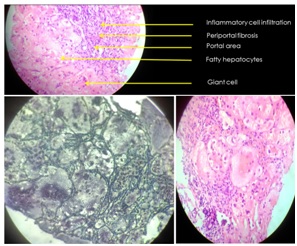Bile acid synthesis defect (5B-reductase deficiency) a rare cause of cholestasis in an infant
Abstract
Bile acid synthesis disorders (BASD) are rare inborn errors of metabolism and its presentation includes- neonatal cholestasis, neurologic disease or deficiency of fat-soluble-vitamins. 1The trait features of these diseases are failure to produce normal bile acids, which leads to accumulation of unusual bile acids and bile acid intermediaries in liver and blood. Pathophysiological manifestations are due to deficiency of bile acids in gastrointestinal tract and accumulation of bile acid intermediates. Delay in initiating treatment can result in progressive chronic liver disease and liver failure. Bile acid therapy can lead to remarkable clinical response, if disorder is recognized earlier and liver transplant can be averted. Here we present an infant with cholestatic jaundice with chronic liver disease and subdural hematoma who was diagnosed to have 5 beta reductase deficiency.
Downloads
References
2. Parks DJ, Blanchard SG, Bledsoe RK, et al. Bile acids: natural ligands for an orphan nuclear receptor. Science. 1999 May 21;284(5418):1365-8.[pubmed]
3. Kuipers F, Claudel T, Sturm E, et al. The Farnesoid X Receptor (FXR) as modulator of bile acid metabolism. Rev Endocr Metab Disord. 2004 Dec;5(4):319-26. DOI:10.1023/B:REMD.0000045103.00467.9a.[pubmed]
4. Vlahcevic ZR, Jairath SK, Heuman DM, Stravitz RT, Hylemon PB, Avadhani NG, Pandak WM. Transcriptional regulation of hepatic sterol 27-hydroxylase by bile acids. Am J Physiol Gastrointest Liver Physiol. 1996;270:G646–G652.
5. Ichimiya H1, Egestad B, Nazer H, Baginski ES, Clayton PT, Sjövall J. Bile acids and bile alcohols in a child with hepatic 3 beta-hydroxy-delta 5-C27-steroid dehydrogenase deficiency: effects of chenodeoxycholic acid treatment. J Lipid Res. 1991; 32:829–841.
6. Gonzales E, Cresteil D, Baussan C, Dabadie A, Gerhardt MF, Jacquemin E. SRD5B1 (AKR1D1) gene analysis in delta(4)-3-oxosteroid 5beta-reductase deficiency: evidence for primary genetic defect. J Hepatol. 2004;40:716-718. DOI: 10.1016/j.jhep.2003.12.024]
7. Setchell KD, Suchy FJ, Welsh MB, et al. Delta 4-3-oxosteroid 5 beta-reductase deficiency described in identical twins with neonatal hepatitis. A new inborn error in bile acid synthesis. J Clin Invest. 1988 Dec;82(6):2148-57. DOI:10.1172/JCI113837.[pubmed]
8. Heubi JE, Setchell KD, Bove KE. Inborn errors of bile acid metabolism. Semin Liver Dis. 2007 Aug;27(3):282-94. DOI:10.1055/s-2007-985073.[pubmed]
9. Shneider BL, Setchell KD, Whitington PF, et al. Delta 4-3-oxosteroid 5 beta-reductase deficiency causing neonatal liver failure and hemochromatosis. J Pediatr. 1994 Feb;124(2):234-8.[pubmed]
10. Bove KE, Daugherty CC, Tyson W, et al. Bile acid synthetic defects and liver disease. Pediatr Dev Pathol. 2000 Jan-Feb;3(1):1-16.[pubmed]
11. Clayton PT, Mills KA, Johnson AW, et al. Delta 4-3-oxosteroid 5 beta-reductase deficiency: failure of ursodeoxycholic acid treatment and response to chenodeoxycholic acid plus cholic acid. Gut. 1996 Apr;38(4):623-8. DOI:10.1136/gut.38.4.623.[pubmed]
12. Shikha S Sundaram, Kevin E Bove, Mark A Lovell, and Ronald J Sokol. Mechanisms of Disease: inborn errors of bile acid synthesisNat Clin Pract Gastroenterol Hepatol. 2008 August; 5(8): 456–468.

Copyright (c) 2019 Author (s). Published by Siddharth Health Research and Social Welfare Society

This work is licensed under a Creative Commons Attribution 4.0 International License.


 OAI - Open Archives Initiative
OAI - Open Archives Initiative


